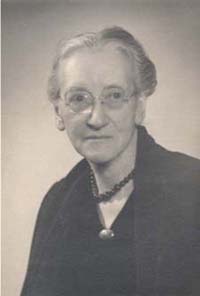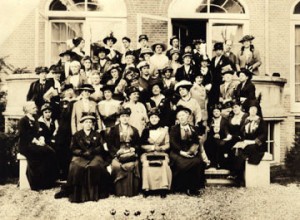 Call for Contributions
Call for Contributions
17th International Conference on Theory and Practice of Digital Libraries
Valetta, Malta, September 22-26, 2013
Full Information: http://www.tpdl2013.info
The International Conference on Theory and Practice of Digital Libraries
constitutes a leading European scientific forum on digital libraries that
brings together researchers, developers, content providers and users in
the field of digital libraries. The 17th International Conference on
Theory and Practice of Digital Libraries (TPDL 2013) is organized by the
University of Malta and it will be held in Valetta, Malta on September
22-26, 2013.
* Aims and scope *
Valuable and rapidly increasing volumes of data are produced or
transformed into digital form by all fields of science, education,
culture, business and government. For this purpose the digital libraries
community has developed long-term and interdisciplinary research agendas,
providing significant results such as conceptual models, added value
infrastructures, software tools, standards and services.
The advent of the technologies that enhance the exchange of information
with rich semantics is on the centre of the discussions of the community.
Information providers inter-link their metadata with user contributed data
and offer new services outlooking to the development of a web of data and
addressing the interoperability and long-term preservation challenges.
TPDL 2013 under the general theme “sharing meaningful information”,
invites submissions describing original, unpublished research and not (and
will not be) simultaneously under consideration for publication elsewhere,
for the proliferation of scientific and research osmosis in the following
categories: Full Papers, Short Papers, Posters and Demonstrations,
Workshops and Tutorials, Panels and Doctoral Consortium. All submissions
will be reviewed on the basis of relevance, originality, importance and
clarity in a triple peer review process.
The TPDL 2013 proceedings will be published by Springer-Verlag in the
Lecture Notes in Computer Science series
(http://www.springer.com/computer/lncs). According to the Registration
Regulation for TPDL 2013, inclusion of papers in the Proceedings is
conditional upon registration of at least one author per paper.
The authors of the best research papers presented to TPDL2013 will be
invited to submit substantially extended versions of their paper for
publication in a Focused Issue of the International Journal on Digital
Libraries
(http://www.springer.com/computer/database+management+%26+information+retrieval/journal/799).
Doctoral Consortium papers will be published by the Bulletin of the IEEE
Technical Committee on Digital Libraries (IEEE-TCDL Bulletin,
http://www.ieee-tcdl.org/Bulletin/current/index.html)
* Topics *
General areas of interests include, but are not limited to, the following
topics, organized in four categories, according to a conceptualization
that coincides with the four arms of the Maltese Cross:
Foundations
– Information models
– Digital Library conceptual models and formal issues
– Digital Library 2.0
– Digital library education curricula
– Economic and legal (e.g. rights management), landscape for digital
libraries
– Theoretical models of information interaction and organization
– Information policies
– Studies of human factors in networked information
– Scholarly primitives
– Novel research tools and methods with emphasis on digital humanities
– User behavior analysis and modeling
– Social-technical perspectives of digital information
Infrastructures
– Digital Library architectures
– Cloud and grid deployments
– Federation of repositories
– Collaborative and participatory information environments
– Data storage and indexing
– Big data management
– e-science, e-government, e-learning, cultural heritage infrastructures
– Semi Structured data
– Semantic web issues in digital libraries
– Ontologies and knowledge organization systems
– Linked data and their applications
Content
– Metadata schemas with emphasis to metadata for composite content
(Multimedia, geographical, statistical data and other special content
formats)
– Interoperability and Information integration
– Digital Curation and related workflows
– Preservation, authenticity and provenance
– Web archiving
– Social media, and dynamically generated content for particular
uses/communities (education, science, public, etc.)
– Crowdsourcing
– 3D models indexing and retrieval
– Authority management issues
Services
– Information Retrieval and browsing
– Multilingual and Multimedia Information Retrieval
– Personalization in digital libraries
– Context awareness in information access
– Semantic aware services
– Technologies for delivering/accessing digital libraries, e.g., mobile
devices
– Visualization of large-scale information environments
– Evaluation of online information environments
– Quality metrics
– Interfaces to digital libraries
– Data mining/extraction of structure from networked information
– Social networks analysis and virtual organizations
– Traditional and alternative metrics of scholarly communication
– Mashups of resources
* Important Dates *
– Full and Short papers, Posters and Demonstrations: March 23, 2013
– Panels, Workshops, Tutorials: March 4, 2013
– Notification of acceptance for Papers, Posters, and Demonstrations:
May 20, 2013
– Notification of acceptance for Panels, Workshops and Tutorials:
April 22, 2013
– Camera Ready Versions: June 9, 2013
– Doctoral Consortium Papers Submission Deadline: June 2, 2013
– Doctoral Consortium Acceptance Notification: July 2, 2013
– End of Early Registration: July 31, 2013
– Conference Dates: September 22-26, 2013
* Formatting Instructions *
Full papers (12 pages), short-papers (6 pages), posters and
demonstrations (4 pages) must be written in English and submitted in
PDF format. The TPDL 2013 proceedings will be published by
Springer-Verlag in Lecture Notes in Computer Science
(http://www.springer.com/computer/lncs). Therefore all submissions
should conform to the formatting instructions described in the “For
Authors” webpage
(http://www.springer.com/computer/lncs?SGWID=0-164-6-793341-0). For
Doctoral Consortium, papers are expected to have a maximum of 8-10
pages, including references. Papers is recommended to be formatted
according to Springer LNCS guidelines.
In case your paper includes images or screenshots please ensure that you
set image compression at 600dpi when you produce your PDF file.
* Submission *
All papers, short-papers, posters and demonstrations must be submitted
in electronic format (PDF) via the conference’s EasyChair submission
page (TBA).
* Organization *
General Chairs:
Milena Dobreva, University of Malta, Malta
Giannis Tsakonas, University of Patras, Greece
Program Chairs:
Trond Aalberg, Norwegian University of Science and Technology, Norway
Christos Papatheodorou, Ionian University, Greece
Organizing Chair:
Charles J. Farrugia, National Archives, Malta
 SAVE the DATE and CFP: Mediating Public Spheres:
SAVE the DATE and CFP: Mediating Public Spheres:





